-
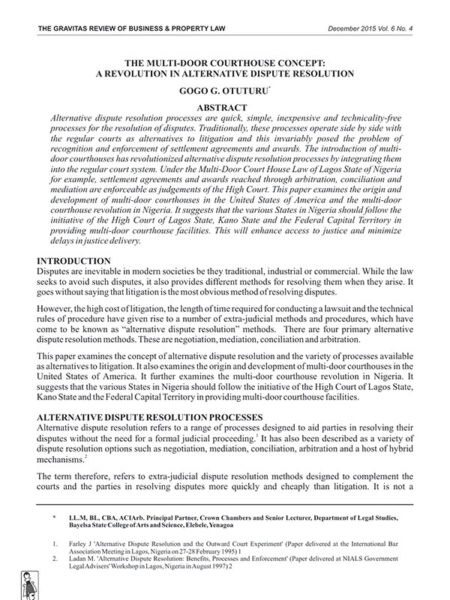
The Multi-door Courthouse Concept: A Revolution in Alternative Dispute Resolution
0₦2,500.00Gogo Otuturu, Principal Partner, Crown Chambers and Senior Lecturer, Department of Legal Studies, Bayelsa State College of Arts and Science, Elebele, Yenagoa in “The Multi-Door Courthouse Concept: A Revolution In Alternative Dispute Resolution” examines the various forms of alternative dispute resolution, the challenge of enforcement of ADR awards and the attraction of the Multi-Door Courthouse concept.
-
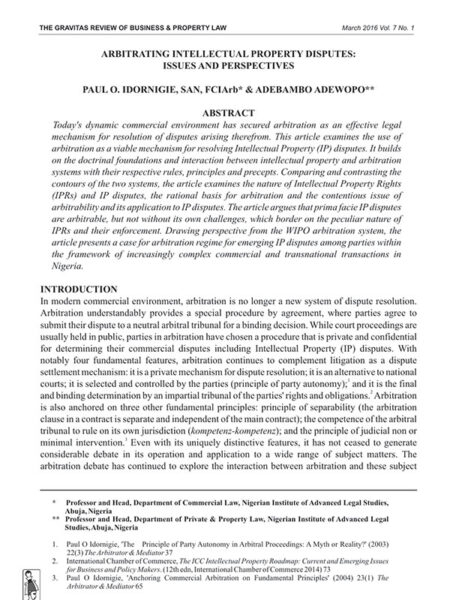
Arbitrating Intellectual Property Disputes: Issues and Perspectives
0₦2,500.00Professor Paul Idornigie, SAN & Professor Adebambo Adewopo, both of the Nigerian Institute of Advanced Legal Studies in their article, “Arbitrating Intellectual Property Disputes: Issues and Perspectives” examines the nature of Intellectual Property Rights (IPRs) and IP disputes, the rational basis for arbitration and the contentious issue of arbitrability and its application to IP disputes. The article argues that prima facie IP disputes are arbitrable, but not without its own challenges, which border on the peculiar nature of IPRs and their enforcement. Drawing perspective from the WIPO arbitration system, the article presents a case for arbitration regime for emerging IP disputes among parties within the framework of increasingly complex commercial and transnational transactions in Nigeria.
-
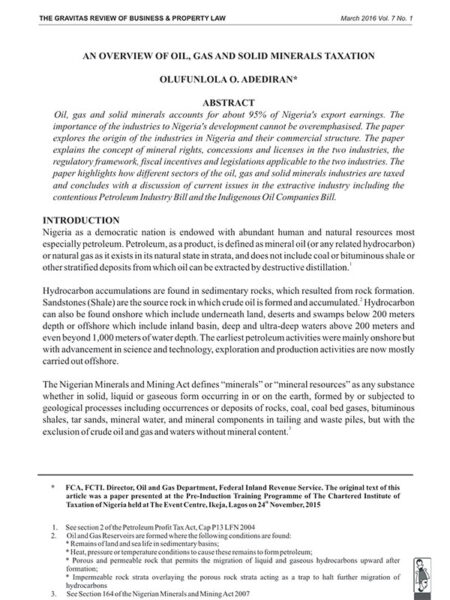
An Overview of Oil, Gas and Solid Minerals Taxation
0₦2,500.00Olufunlola Adediran, Director, Oil and Gas Department, Federal Inland Revenue Service in “An Overview of Oil, Gas and Solid Minerals Taxation” examines the commercial structure of the oil, gas and solid minerals industries. She explains the concept of mineral rights, concessions and licenses in the two industries, the regulatory framework, fiscal incentives and legislations applicable to them. She highlights how different sectors of the oil, gas and solid minerals industries are taxed and discusses current issues in the extractive industry including the contentious Petroleum Industry Bill and the Indigenous Oil Companies Bill.
-
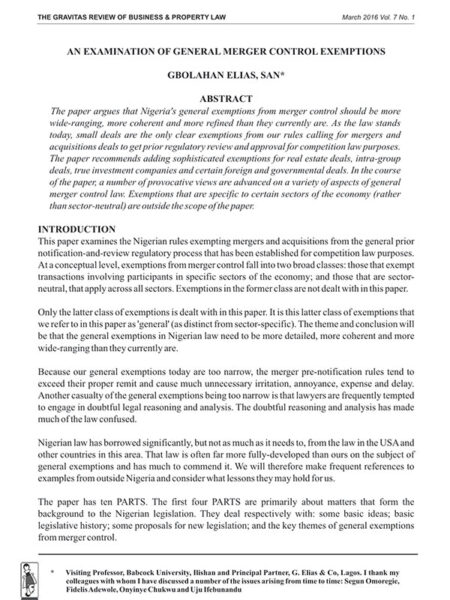
An Examination of General Merger Control Exemptions
0₦2,500.00Professor Gbolahan Elias, SAN, Principal, G.E. Elias & Co in this monumental work “An Examination of General Merger Control Exemptions” analyses the state of Nigerian law with regards to preview and review in cases of mergers, acquisitions and business combinations. He argues that as the law stands, small deals are the only clear exemption from our rules calling for mergers and acquisitions deals to get prior regulatory review and approval for competition law purposes. Drawing on international comparison, the paper argues that the holding company exemption provided for in the Investments and Securities Act is questionable and advocated the need to add exemptions for real estate deals, intra-group deals, investment companies and certain foreign and governmental deals.
-
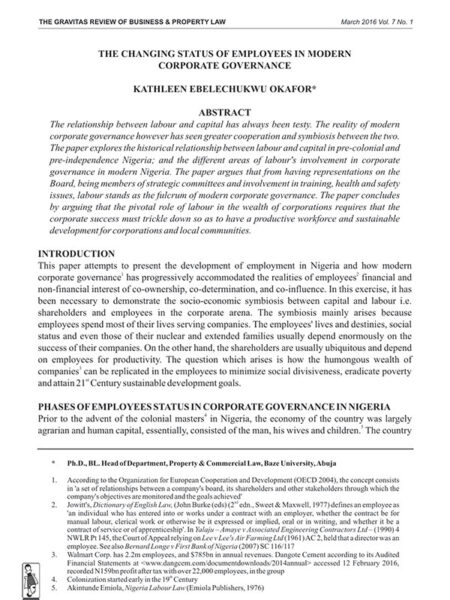
The Changing Status of Employees in Modern Corporate Governance
0₦2,500.00Dr Kathleen Okafor, Head, Department of Property & Commercial Law, Baze University, Abuja examines “The Changing Status of Employees in Modern Corporate Governance». She posits that modern corporate governance has seen greater cooperation and symbiosis between labour and capital which has accommodated the realities of employees’ financial and non-financial interest of co-ownership, co-determination, and co-influence. She explores the different areas of employees’ involvement in corporate governance and concludes that the pivotal role of labour in the wealth of corporations requires that the corporate success must trickle down for sustainable development of corporations and local communities.
-
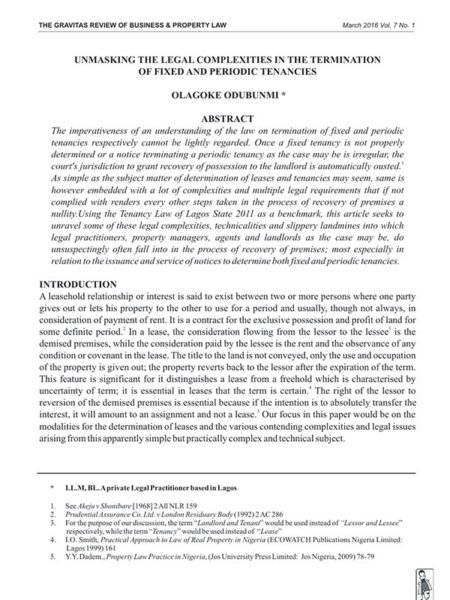
Unmasking the Legal Complications in the Termination of Fixed and Periodic Tenancies
0₦2,500.00Against the background of the Tenancy Law of Lagos State 2011, Olagoke Odubunmi, Lagos based legal practitioner, in his article “Unmasking the Legal Complexities in the Termination of Fixed and Periodic Tenancies” seeks to unravel the complexities, technicalities and slippery landmines into which legal practitioners, property managers, agents and landlords, do unsuspectingly often fall into in the process of recovery of premises, most especially in the termination of fixed and periodic tenancies.
-
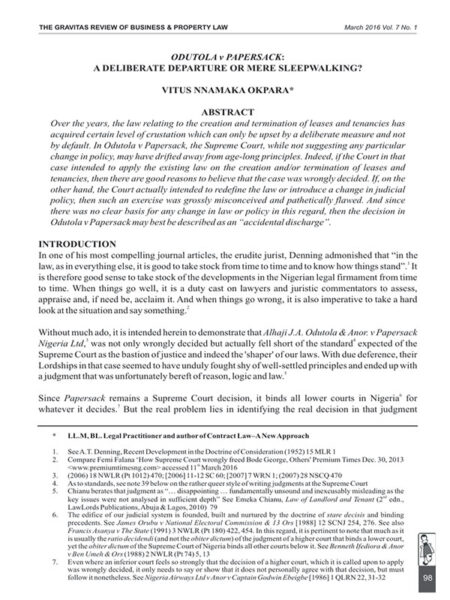
Odutola v Papersack: A Deliberate Departure or mere Sleepwalking?
0₦2,500.00Vitus Okpara, legal practitioner and author of Contract Law–A New Approach, continues the discussion on termination of tenancies in his article “Odutola v Papersack: A Deliberate Departure or Mere Sleepwalking?” In this compelling review, Okpara asks whether the Supreme Court intended to depart from a long line of its previous decisions on creation and termination of tenancies or the decision in Papersack was an “accidental discharge”.
-
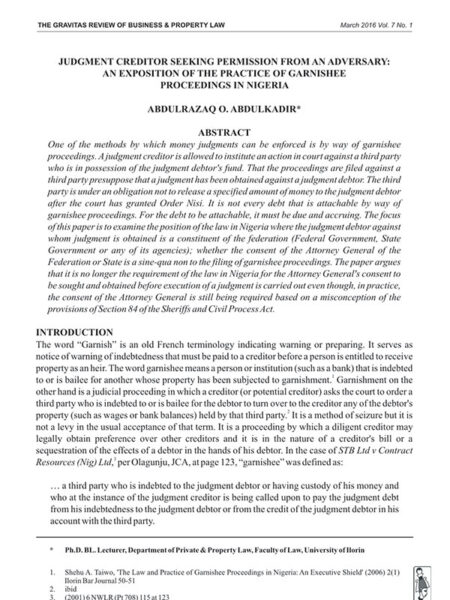
Judgement Creditor Seeking Permission from an Adversary: An Exposition of the Practice of Garnishee Proceedings in Nigeria
0₦2,500.00Dr Abdulrazaq Abdulkadir of the Department of Private & Property Law, University of Ilorin in his article “Judgment Creditor Seeking Permission from an Adversary: An Exposition of the Practice of Garnishee Proceedings in Nigeria” examines the practice of courts requiring judgment creditors seeking to file garnishee proceedings against the government to seek the consent of the Attorney General. He argues that the practice is against the provision of the 1999 Constitution and may be a result of a misconception of the implications of Section 84 of the Sheriffs and Civil Process Act.
-
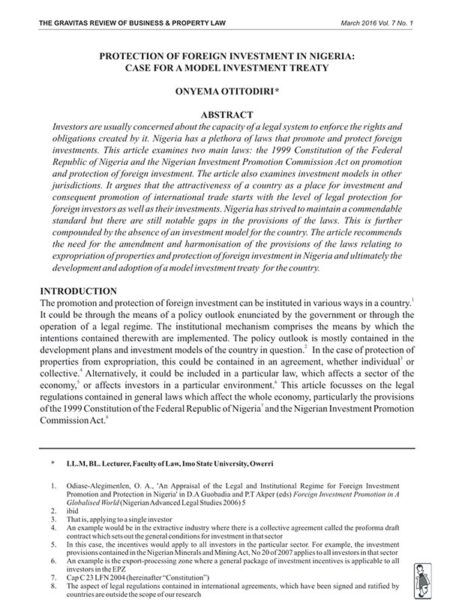
Protection of Foreign Investment in Nigeria: Case for a Model Investment Treaty
0₦2,500.00Onyema Otitodiri, Lecturer, Faculty of Law, Imo State University, Owerri in “Protection of Foreign Investment in Nigeria: Case for a Model Investment Treaty” analyses the state of Nigerian law on foreign investment, its promotion, protection and probable expropriation. He makes a case for the adoption of a model investment treaty to harmonise the provision of the laws and standardise treatment of foreign investors.
-
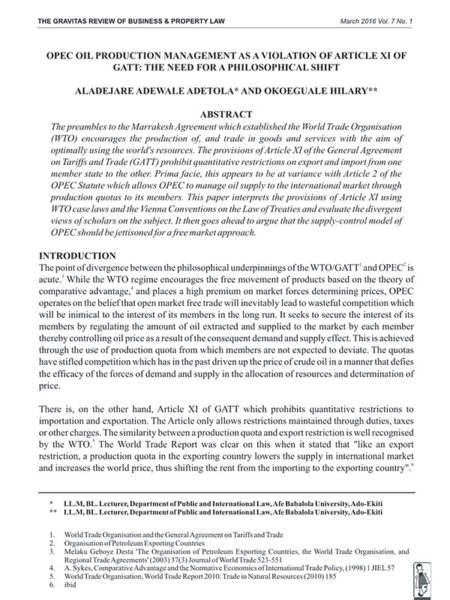
OPEC Oil Production Management as a Violation of Article XI of GATT: The Need for a Philosophical Shift
0₦2,500.00Aladejare Adetola and Okoeguale Hilary of the Department of Public and International Law, Afe Babalola University, Ado-Ekiti in their article “OPEC Oil Production Management as a violation of Article XI of GATT: The Need for a Philosophical Shift” analyses contending positions on whether OPEC oil production quota violates Article XI of the General Agreement on Tariffs and Trade (GATT) which prohibits quantitative restrictions on export and import from one member state to the other. Interestingly, the decisive element in the controversy may be whether oil is a “good” or “product”.
-
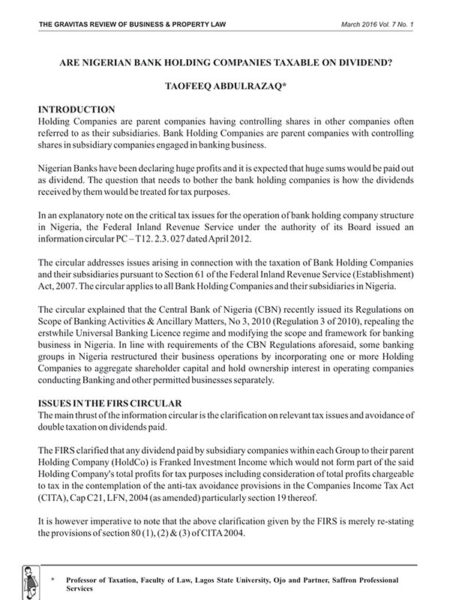
Are Nigerian Bank Holding Companies Taxable on Dividend?
0₦2,500.00Professor Taofeeq Abdulrazaq, Provost, Nigerian Academy of Taxation and Partner, Saffron Professional Services in his article “Are Nigerian Bank Holding Companies Taxable On Dividend?” examines the provisions of the Companies Income Tax Act and FIRS Circulars on Franked Investment Income and the liability of holding companies for tax on dividend paid by their subsidiary companies.
-
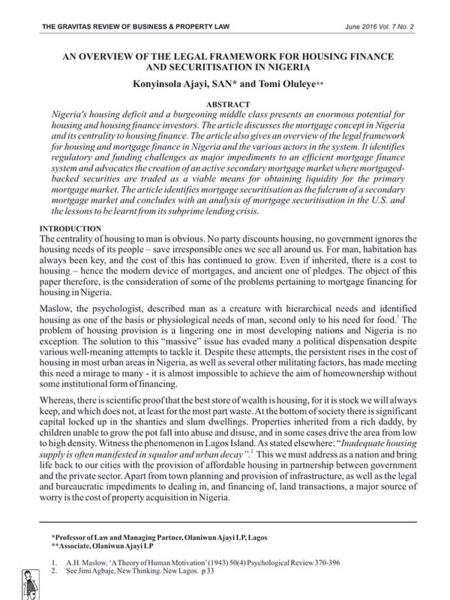
An Overview of the Legal Framework for Housing Finance and Securitisation in Nigeria
0₦2,500.00Professor Konyinsola Ajayi, SAN & Tomi Oluleye of Olaniwun Ajayi LP in their article, “An Overview of the Legal Framework for Housing Finance and Securitisation in Nigeria” discuss the mortgage concept in Nigeria and its centrality to housing finance. They give an overview of the legal framework for housing and mortgage finance in Nigeria and the various actors in the system. They identify how the Land Use Act and funding challenges hamper an efficient mortgage finance system and advocate the creation of an active secondary mortgage market where mortgaged-backed securities are traded as a viable option in obtaining liquidity for the primary mortgage market. They recognise mortgage securitisation as the fulcrum of a secondary mortgage market and conclude with an analysis of mortgage securitisation in the U.S and the lessons to be learnt from its subprime lending crisis.
The Gravitas Review of Business & Property Law



